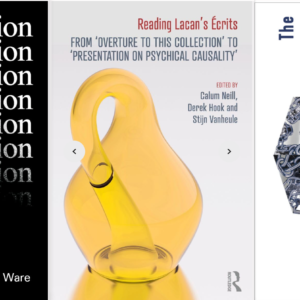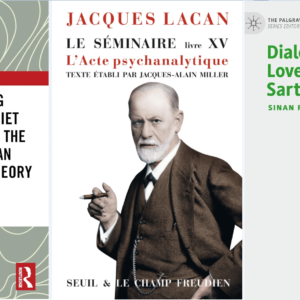News – October 2020
Want to receive this news via email each month? Sign up here.
20% off and free global shipping on all Routledge titles for LacanOnline.com readers. Use this link and code S031 at the checkout.
The second volume in the Studying Lacan’s Seminars series has been announced for release next year by Routledge. Studying Lacan’s Seminar VI: Dream, Symptom, and the Collapse of Subjectivity is authored by Olga Cox Cameron and Carol Owens and is intended to accompany Bruce Fink’s recent translation of the Seminar itself. It explores the themes and ideas elaborated by Lacan in this period of his teaching in the late 1950s, including on the object a, the fundamental fantasy, aphanisis, and the new meaning Lacan gives to the term ‘phallus’. Two essays by Cox Cameron form the appendices, one critiquing the latter concept, the other providing an overview of Lacan’s Seminar VI itself, originally delivered as the keynote address to the APW Congress which took place in Toronto in 2014. In the meantime before the book comes out, check out the first volume in the series – Studying Lacan’s Seminar IV and V: From Lack to Desire – which was released at the end of 2018. A 20% discount is available when ordering direct from the publishers by using the link and the code at the top of this page.
Berjanet Jazani’s Lacanian Psychoanalysis from Clinic to Culture will be released at the end of November, the latest in the collection from The Centre for Freudian Analysis and Research Library from Routledge. Blending an accessible introduction to the key concepts of Lacan’s thoughts with examples drawn from popular culture and the author’s own Persian heritage, it is also in part biographical, with Jazani tracing her own journey from post-revolutionary Iran to a world reshaped by artificial intelligence, always-on connectivity, and the political challenges posed by radicalisation. Having spoken at the recent College of Psychoanalysts UK annual conference, Jazani has also written a piece for the College on how psychoanalysis can respond to the pandemic, which is available here.
Raul Moncayo’s The Practice of Lacanian Psychoanalysis: Theories and Principles was published at the start of November. Considering Lacan’s work from the perspective of Aristotle’s epistemology, Moncayo propooses a model for diagnosis which separates underlying structure from surface symptoms coupled with a commentary on key clinical topics for Lacanian practice such as the transference, the desire of the analyst, and identification with the sinthome.
Routledge released Thresholds and Pathways Between Jung and Lacan: On the Blazing Sublime, edited by Ann Casement, Phil Goss, and Dany Nobus, last month. The product of the joint Jung-Lacan conference held in Cambridge, England to mark 100 years since the First World War, this collection provides original perspectives on the theme of the sublime, and themes associated with us such as destruction and creativity.
Tales of Research Misconduct: A Lacanian Diagnostics of Integrity Challenges in Science Novels by Hub Zwart was published in hard- and softcover formats in October. Looking at the subject of scientific misconduct (fabrication, falsification, plagiarism, etc) by analysing several novels which have this as their subject, Lacanian psychoanalysis and other continental philosophy perspectives are used to bring to the fore issues of integrity connected to individual deviance and system crisis in the way knowledge is produced and handled.
For French readers, a new work by Abdesselem Rechak, Le grand secret de la psychanalyse was released at the end of October. Looking at Lacan’s engagement with the Islamic tradition, it starts from his formula that there is no Other of the Other, but argues that this can be read to mean ‘there is no Other God than the God of Islam’, and that this is the final guarantee of God. Furthermore, Rechak argues that the Lacan’s thought and the Islamic faith follow “exactly the same logic” insofar as they both rest on the denial of semblants. It can be ordered from Amazon.
Among events, a symposium to mark the centenary of the publication of Freud’s Beyond the Pleasure Principle will take place (online) on Saturday 5th Dec. Pleasuring Freud, hosted by the Glasgow School of Art and The Drouth features speakers Pippa Goldschmidt, Isabel Millar, Laura Gonzalez, and Lorens Holm. The event is free and open to all. Sign up on Eventbrite here. In collaboration with the Glasgow School of Art, The Drouth will be marking the occasion with a week-long online programme which will reach its climax on Saturday 5th December with the online symposium. Throughout the week, The Drouth will be seeking to publish creative and critical gestures which respond to Beyond the Pleasure Principle and its afterlives, from the vantage point of our contemporary moment. To this end, they invite contributions to the body of work which will be published by The Drouth as part of its week-long séance with the legacy of Freud and this significant text. Its scope is “vast and polymorphous” and as such it welcomes academic, theoretical, critical and creative reflections, reassessments, contestations and comments in textual, visual or multimedia form. As a publication which takes the interrogation of thought and culture seriously, it encourages the expression of ideas which transgress the boundaries of discipline, form and convention. Submissions are invited to be sent to pleasuringfreud2020@gmail.com by Sunday 15th November.
As referenced above, the College of Psychoanalysts UK site now includes papers presented at the recent international conference ‘Psychoanalysis in Adverse Conditions’ by Paulo Beer, Anthea Benjamin, Berjanet Jazani, David Pavón-Cuéllar and Carol Owens. Relatedly, Ian Parker from the College participated in an online debate about the SCoPEd project, speaking against it for Partners for Counselling and Psychotherapy, an alliance of 14 organisations including the College of Psychoanalysts.
Newly-announced by the Freud Museum London is the international online conference Psychoanalysis for the People: Free Clinics and the Social Mission of Psychoanalysis, which will run 16th-17th January. It is devoted to exploring socially engaged psychoanalytic practices from across the world, a tradition that started from Freud himself, who in 1918 placed the free clinic at the heart of psychoanalytic thought and practice, predicting that out-patient clinics would be started where treatment would be free. Free and low-cost clinics were thereafter established in Vienna, Berlin and Budapest. The conference’s keynote lecture is given by Patricia Gherovici, and twelve other speakers will contribute to the two-day conference. More details and a link to book are available on the Freud Museum’s site here.
Finally, Lacan Toronto will be hosting Sergio Benvenuto for a talk on ‘Lacan’s View of Perversions: A Perverse Theory?’ on Saturday 21st November. Benvenuto is the author of a What are Perversions: Sexuality, Ethics, Psychoanalysis which was released last year. More information and details of how to join are available on the group’s Facebook page.
Got news? Get in touch.




Leave a Reply